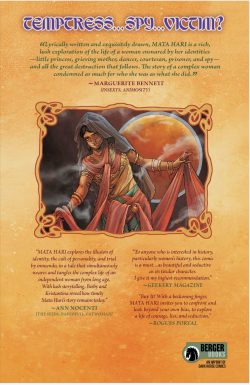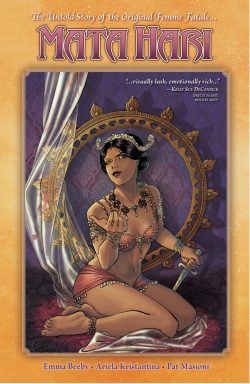

By Emma Beeby, Ariela Kristantina, with Pat Masioni & Sal Cipriano (Berger Books/ Dark Horse)
ISBN: 987-1-50670-561-3(TPB) eISBN: 987-1-50670-590-3
Until relatively recently (some would argue that should read “hopefully soon”), History has never really treated women well or even factually or fairly. When not obscured, sidelined or just written out, they have been cruelly misunderstood and misrepresented. Moreover, as we’re all painfully aware these days, a bold lie or convenient fabrication has far more veracity than simple, muddled, messy truth.
Margaretha Geertruida “Margreet” MacLeod (nee Zelle) was born on August 7th 1876 in Leeuwarden (in the Dutch Netherlands) to milliner and later industrialist Adam Zelle. She was the eldest of four children raised in wealth… until her father lost it all. Margreet’s life became more troubled and remarkable after that, before she died on 15th October 1917 in front of a French firing squad.
In between, she had married, lived in the East Indies, had children she never really knew and artfully remade herself as a rather scandalous dancer and performer. Margreet adopted a stage name – Mata Hari (which means “eye of the dawn” in Malay) – and her gifts, drive and determination led to her becoming a successful courtesan in the highest circles of privileged society, with princes, ambassadors, tycoons and generals all clamouring for her attention. She was also courted by some countries – including France and Great Britain – to act as an operative in the dangerous world of espionage.
After a chequered life during a volatile period when European society seemingly embraced and welcomed strong independent women, she was accused on meagre evidence of spying for the Germans during the Great War, and rapidly convicted. Deemed to have caused the death of 50,000 men, and the moral ruination of countless others, Mata Hari became and remains the purest and most enduring symbol of the deadly, cunning femme fatale…
However, in the last few decades, serious historical investigation has cast a rather different, and far fairer complexion on the mythical spy in film, song, ballet, books, musicals and all arenas of popular culture. Among the most compelling was an imaginative 5-issue miniseries from Dark Horse’s Berger Books imprint: a collaboration of writer Emma Beeby (Judge Dredd, Doctor Who, Judge Anderson), artist Ariela Kristantina (Wolverine: The Logan Legacy, Deep State, Insexts), colourist Pat Masioni and letterer Sal Cipriano.
Blending hard fact with emotive supposition and informed extrapolation, the sorry episode unfolds in the flashbacks and daydreams of a prisoner held at the Saint-Lazare Prison for Prostitutes in Paris in October 1917. Opening chapter ‘Bare Faced’ introduces Margreet as she strives and struggles to complete a book that will tell her story in her own words…
Against a backdrop of political and military manipulation resolved to make an example of her, ‘Bare Breast’ details her disastrous, life changing marriage and its terrible consequences whilst ‘Bare Heart’ relates her fight back to independence and notoriety after which ‘Bare Teeth’ moves on to the war and great love for a Russian soldier that led to her downfall in ‘Bare All’…
Real life doesn’t work the way narrative would like and the people there aren’t actors. Packed with documentary photos, this contemplative fable carefully acknowledges all that frustrating complexity in an account scrupulously devoid of heroes and outright villains whilst exposing centuries of institutionalised injustice in an extremely entertaining manner. It closes with a series of textual Codas (offering even more intimate photos of the woman and her times) with ‘Mata Hari’s Conviction’, relating oddities and strange events regarding the disposal of her body plus an authorial opinion by Beeby in ‘Was Mata Hari a Martyr?’…
In both word and imagery, Mata Hari is a potently beguiling, evocatively uncompromising retelling of a murky and long-misconceived moment in history any student of the past and lover of comics will adore.
Mata Hari text and illustrations © 2019 Emma Beeby and Ariela Kristantina. All rights reserved.
